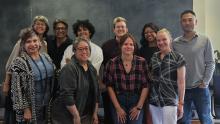Overview
The Department of Gender, Women & Sexuality Studies (GWSS) at the University of Washington is a national leader in advancing analyses of gender and sexuality in relation to race, class, and disability; in debates about U.S. Women of Color and transnational feminisms; and in terms of queer and trans studies. We welcome students into a dynamic, interdisciplinary environment, where they learn to ask critical questions and break down conventional academic assumptions, cultivating a deeper understanding of individual, social, and political inequities as well as movements for change.
Our department includes nine full-time faculty, five emerit faculty, and over fifty adjunct and affiliate faculty across multiple disciplines in the Arts, Humanities, Social Sciences, Informatics, International Studies, and Medicine.
Mission
GWSS draws upon multiple strands of feminist thought to foreground transformative intersectional and transnational analyses of social formations such as race, ethnicity, class, gender, and sexuality, as shaped in conjunction with local and global political and economic structures.
When we were founded in 1970 as the Women Studies Program, the University of Washington become one of the first campuses in the United States to institutionally support research and teaching dedicated to questions of gender, sexuality, and social justice. Since then, we have remained at the cutting edge of the field, from pioneering the first PhD program in the Pacific Northwest to transforming the discipline to focus on gender and sexuality writ large, as reflected in our name change to Gender, Women & Sexuality Studies in 2011.
Programs
Undergraduate Programs
Our program consists of a major and a minor, designed to give students a thorough grounding in feminist theory and methodology as well as the opportunity to apply their knowledge in ways that fit their own interests and goals. These pathways provide frameworks for understanding the intersectional dynamics of race, gender, sexuality, and social justice in both historical and contemporary contexts. Undergraduate majors complete a senior capstone—a distinctive mark of our commitment to excellence in writing and critical thinking. Students may also complete an internship, linking their skills to community-based social justice practice.
Graduate Programs
In addition to our undergraduate offerings, we have been training graduate students since 1998 and offer a Ph.D. in Feminist Studies. We also offer graduate certificate programs in Feminist Studies and Sexuality and Queer Studies, open to all graduate students at UW.
Career Preparation
Our alums are adept collaborators who have experience working in settings with diverse perspectives and critical agility in creatively addressing the world’s persistent and urgent problems. They use these skills in a variety of fields, including business, creative arts and humanities, museum curation, education, government, health care, law, media and communication, nonprofit administration, social work and counseling, public policy, and technology. Graduates of our doctoral program work at research universities, liberal arts and community colleges, cultural institutions, governmental agencies, and nonprofit organizations.
Fact Sheet
For more detailed information about our program, check out our fact sheet!
